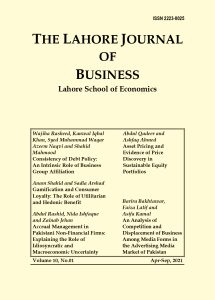The Impact of Managerial Shareholding and Financial Constraints on Investment Decisions
- Muneezay Tariq
- muneezy95@hotmail.com
- Research Scholar, School of Social Sciences & Humanities, National University of Sciences and Technology, Islamabad, Pakistan.
- Muhammad Zubair Mumtaz
- mmumtaz@uob.edu.bh
- Associate Professor, College of Business Administration, University of Bahrain, Sakhir, Bahrain.
- (Corresponding Author)
- Nouman Afgan
- drnoumanafganaustriaeducation@gmail.com
- Professor Department of Economics, Hajvery University, Lahore, Pakistan.
Submitted
November 22, 2023
Accepted
November 22, 2023
Accepted
November 22, 2023
- Received
- 31 March 2024
- Revised
- 11 July 2024
- Accepted
- 26 October 2024
Abstract
Agency conflicts arising from asymmetric information between insiders and outsiders affect
company investment decisions in imperfect capital markets. This study examines the influence of
managerial shareholding and financial constraints on investment choices. Utilizing panel data from 60
nonfinancial firms listed on the Pakistan Stock Exchange from 2011 to 2020, we employ the system GMM
technique. Our findings indicate that both managerial shareholding and financial constraints
significantly impact corporate investment decisions. Increased managerial ownership aligns incentives
favorably, helping to mitigate agency problems and enhance the quality of investment projects. The
reliance on internally generated funds for investments points to a high investment-to-cash-flow
sensitivity, which reflects financial constraints. This study further investigates the factors influencing
investment decisions in the manufacturing and energy/power sectors. Our results show that firms in the
energy/power sectors are not financially constrained in their investments, while manufacturing firms
exhibit a strong dependence on cash flows, indicating higher investment cash flow sensitivities.
Keywords
Managerial shareholding
financial constraints
corporate investment
Pakistan Stock Exchange
This work is licensed under LJB.
- Citation
Tariq, M., Mumtaz, M. Z., & Afgan, N. (2024). The Impact of Managerial Shareholding
and Financial Constraints on Investment Decisions. The Lahore Journal of Business, 12(1), 65-90.
- References
- Aggarwal, R. K., & Samwick, A. A. (2006). Empire-builders and shirkers: Investment, firm performance, and managerial incentives. Journal of Corporate Finance, 12(3), 489–515.
- Ali, S., Naveed, M., Gubareva, M., & X. V. Vo (2024b). Reputational contagion from the Silicon Valley Bank debacle. Research in International Business and Finance, 69, 102275.
- Ali, S., Naveed, M., Hanif, H., & Gubareva, M. (2024c). The resilience of Shariah-compliant investments: Probing the static and dynamic connectedness between gold-backed cryptocurrencies and GCC equity markets. International Review of Financial Analysis, 91, 103045.
- Ali, S., Naveed, M., Yousaf, I., & Khattak, M. S. (2024a). From cryptos to consciousness: Dynamics of return and volatility spillover between green cryptocurrencies and G7 markets. Finance Research Letters, 60, 104899.
- Allini, A., Rakha, S., McMillan D. G., & Caldarelli, A. (2024). Pecking order and market timing theory in emerging markets: The case of Egyptian firms. Research in International Business and Finance, 44, 297–308.
- Anderson, R. C., Mansi, S. A., & Reeb, D. M. (2006). Managerial ownership and behaviour: the impact on corporate creditors (Working Paper). Fox School of Business, Temple University.
- Andrei, D., Mann, W., & Moyen, N. (2019). Why did the q theory of investment start working? Journal of Financial Economics, 133(2), 251–272.
- Anwar, W., Hasan, A., & Nakpodia, F. (2024). Beyond the bottom line: Exploring the role of governance mechanisms in promoting corporate tax responsibility. Corporate Governance: The International Journal of Business in Society, 24(6), 1472–1496.
- Arellano, M., & Bond, S. (1991). Some tests of specification for panel data: Monte Carlo evidence and an application to employment equations. The Review of Economic Studies, 58(2), 277–297.
- Beck, T., & Maksimovic, V. (2002). Financial and legal constraints to firm growth: Does size matter? World Bank Group.
- Beynon-Davies, P., Jones, P., & White, G. R. T. (2016). Business patterns and strategic change. Strategic Change, 25(6), 675–691.
- Blundell, R., & Bond, S. (1998). Initial conditions and moment restrictions in dynamic panel data models. Journal of Econometrics, 87, 115–143.
- Blundell, R., Bond, S., Devereux, M., & Schiantarelli, F. (1992). Investment and Tobin’s Q: Evidence from company panel data. Journal of Econometrics, 51(1–2), 233–257.
- Campello, M., Graham, J. R., & Harvey, C. R. (2010). The real effects of financial constraints: Evidence from a financial crisis. Journal of Financial Economics, 97(3), 470–487.
- Checkley, M., Steglich, C., Angwin, D., & Endersby, R. (2014). Firm performance and the evolution of cooperative interfirm networks: UK venture capital syndication. Strategic Change, 23(1/2), 107–118.
- Chiu, C. J., Ho, A. Y. F., & Tsai, L. F. (2022). Effects of financial constraints and managerial overconfidence on investment-cash flow sensitivity. International Review of Economics and Finance, 82, 135–155.
- Davies, J. R., Hillier, D., & McColgan, P. (2005). Ownership structure, managerial behavior and corporate value. Journal of Corporate Finance, 11(4), 645–660.
- Demsetz, H., & Lehn, K. (1985). The structure of corporate ownership: Causes and consequences. Journal of Political Economy, 93(6), 1155–1177.
- Dong, J. Q., Karhade, P. P., Rai, A., & Xin, S. (2021). How firms make information technology investment decisions: Towards a behavioral agency theory. Journal of Management Information Systems, 38(1), 29–58.
- Driver, C., & Muñoz-Bugarin, J. (2019). Financial constraints on investment: Effects of firm size and the financial crisis. Research in International Business and Finance, 47, 441–457.
